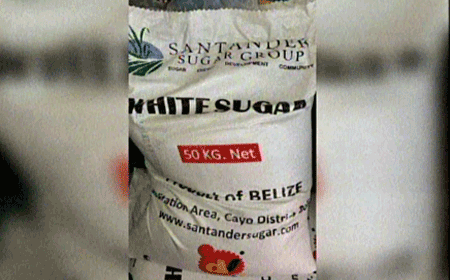GOB warned Santander Sugar to abide by the laws of Belize or risk losing its EPZ status
BELIZE CITY, Thurs. June 14, 2018– Today, Thursday, the Government Press Office issued a press release saying that based on its findings, there is no shortage of sugar in the domestic market and that the Export Processing Zone Committee (EPZC) had decided not to grant a waiver to the Spanish multinational company, Santander Sugar Limited, to sell sugar on the local market.
Not only that: the EPZC had “decided to impose the maximum fine applicable under the EPZ Act” on Santander for “several violations” the company had committed.
Santander Sugar recently created controversy when it reconfigured its factory to produce plantation white sugar and brown sugar that it unleashed on the local market without the necessary permission from the relevant authorities.
After it was busted, Santander issued a cagey press release, saying that it was conducting market research to see what the CARICOM market would accept, and also that the company wanted to be given a slice of the local sugar market.
Santander’s action sparked immediate reaction from the sugar producers in the Orange Walk District, and provoked the three cane farmer associations in the north to fire off a joint letter to the Minister of Agriculture, demanding answers to Santander’s incursion into the local market, and demanding a meeting with Agricultural Minister, Senator Godwin Hulse.
The government press release said the Export Processing Zone Committee (EPZC) met on Tuesday, June 12, to consider two items: (1), “a request made by Santander Sugar Limited, a Belizean EPZ Company, for a waiver to be granted allowing the company to sell approximately 5,000 tons of direct consumption sugar and 2,000 tons of molasses in the domestic market; and (2) violations committed under the Export Processing Zone Act, Chapter 280, Substantive Laws of Belize, by Santander Sugar Ltd.”
In considering the Santander request for a waiver, the committee said it looked at three different criteria: “Will the waiver aid the economic development of Belize? Will it relieve a shortage of sugar in the domestic market? Does it otherwise seem to be in the interest of Belize?”
To arrive at its conclusion, the committee said it accessed information from stakeholders, including “the Ministry of Agriculture, Belize Sugar Industries Ltd., Santander Sugar Limited, Belize Cane Producers Association, Progressive Sugar Cane Producers Association, Corozal Sugar Cane Producers Association (CSCPA), and various national manufacturers.”
Based on its findings, the EPZC concluded, “…there is not any shortage of sugar in the domestic market. Based on this, and other findings of the assessment report, the EPZC decided that market conditions do not warrant the waiver at this time, and hence, the committee was unable to favorably consider Santander’s request to sell sugar and molasses in the local market at this time.”
The release added that the EPZC also looked at several violations by Santander Sugar “…under its Certificate of Compliance and Operations Contract, and in consultation with the Attorney General’s Ministry, decided to impose the maximum fine applicable under the EPZ Act.
“Further to the fine, the Ministry of Investment, Trade, and Commerce has formally notified the company of the need to abide by all the Laws of Belize, and that any further infractions can result in the revocation of its EPZ status.”
(Ed. NOTE: Section 10. (1) of the EXPORT PROCESSING ZONE ACT CHAPTER 280 REVISED EDITION 2003, states: “Where the Ministry finds that a violation has occurred it shall impose a fine of $500 for a first offence, and $1,000 for a second offence…If the Ministry finds that a pattern of such continuing violations has occurred and that the alleged violator will not comply with applicable requirements in the future, it may after proper notice and hearing revoke the Certificate of Compliance and the business will then cease to be eligible for any of the benefits under the EPZ Act.”)

